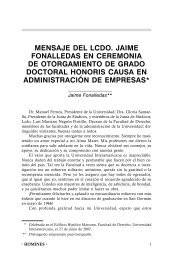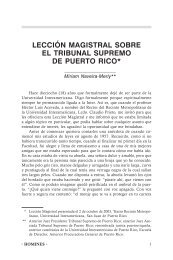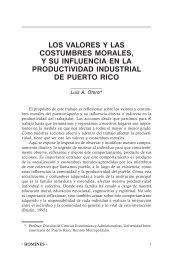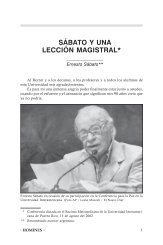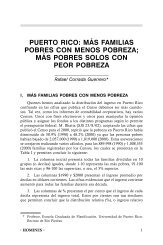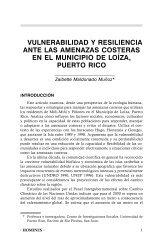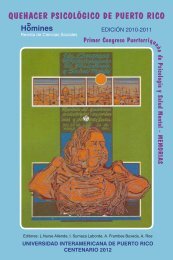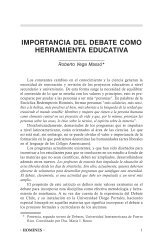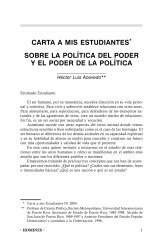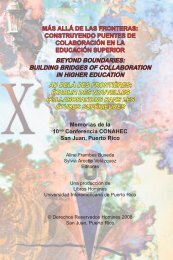- Page 1 and 2:
RELACIONES INTERNACIONALES LECCIONE
- Page 3 and 4:
R E L A C I O N E S I N T E R N A C
- Page 5 and 6:
“Amaneceres para Barranquitas”,
- Page 7 and 8:
ÍNDICE Homines Presentación UNIVE
- Page 9 and 10:
María Cristina Rodríguez Voiceles
- Page 11 and 12:
PRESENTACIÓN RELACIONES INTERNACIO
- Page 13 and 14:
“Llegan los Reyes”, serigrafía
- Page 15 and 16:
UNIVERSIDAD INTERAMERICANA FIRMA MA
- Page 17 and 18:
ha sido aceptada para firmar esta c
- Page 19 and 20:
Universidad Interamericanana de Pue
- Page 21 and 22:
LIZETTE LUGO “LA CASA DE MIS MUÑ
- Page 23 and 24:
LIZETTE LUGO “Adoquín de Corazó
- Page 25 and 26:
LIZETTE LUGO El Mundillo de la Call
- Page 27 and 28:
LIZETTE LUGO 1997 Images of a woman
- Page 29 and 30:
LIZETTE LUGO Housatonic Museum of A
- Page 31 and 32:
LIZETTE LUGO STRINGS ATTACHED SELF-
- Page 33 and 34:
LIZETTE LUGO which are also part of
- Page 35 and 36:
LA METAMORFOSIS DE UN RÉGIMEN PETR
- Page 37 and 38:
ANDRÉS VALDEZ ZEPEDA FACTORES HIST
- Page 39 and 40:
ANDRÉS VALDEZ ZEPEDA El estilo nov
- Page 41 and 42:
ANDRÉS VALDEZ ZEPEDA cambio y perm
- Page 43 and 44:
ANDRÉS VALDEZ ZEPEDA la prohibici
- Page 45 and 46:
ANDRÉS VALDEZ ZEPEDA a la violenci
- Page 47 and 48:
ANDRÉS VALDEZ ZEPEDA el poder esce
- Page 49 and 50:
ANDRÉS VALDEZ ZEPEDA Posiciones ga
- Page 51 and 52:
ANDRÉS VALDEZ ZEPEDA En la elecci
- Page 53 and 54:
ANDRÉS VALDEZ ZEPEDA Coldwell, con
- Page 55 and 56:
ANDRÉS VALDEZ ZEPEDA FACTOR POLÍT
- Page 57 and 58:
ANDRÉS VALDEZ ZEPEDA CONSIDERACION
- Page 59 and 60:
ANDRÉS VALDEZ ZEPEDA Coldwell, Ped
- Page 61 and 62:
ANDRÉS VALDEZ ZEPEDA parative Poli
- Page 63 and 64:
LUIS A. OTERO En el primer escrito
- Page 65 and 66:
LUIS A. OTERO 1996. 5 Éstos fueron
- Page 67 and 68:
LUIS A. OTERO valores, las normas y
- Page 69 and 70:
LUIS A. OTERO La productividad la p
- Page 71 and 72:
LUIS A. OTERO REFERENCIAS CONSULTAD
- Page 73 and 74:
CECIL MARIE CANCEL y el clima han o
- Page 75 and 76:
CECIL MARIE CANCEL dios. Los mujaha
- Page 77 and 78:
CECIL MARIE CANCEL Como resultado,
- Page 79 and 80:
EL ISLAM Carmen A. Cruz Carmona* En
- Page 81 and 82:
CARMEN A. CRUZ CARMONA el Dios úni
- Page 83 and 84:
CARMEN A. CRUZ CARMONA cuenta con v
- Page 85 and 86:
VULNERABILIDAD Y RESILIENCIA ANTE L
- Page 87 and 88:
ZAIBETTE MALDONADO MUÑOZ LOÍZA:
- Page 89 and 90:
ZAIBETTE MALDONADO MUÑOZ EVENTOS E
- Page 91 and 92:
ZAIBETTE MALDONADO MUÑOZ Variable
- Page 93 and 94:
ZAIBETTE MALDONADO MUÑOZ Se afect
- Page 95 and 96:
ZAIBETTE MALDONADO MUÑOZ que no lo
- Page 97 and 98:
ZAIBETTE MALDONADO MUÑOZ IMPACTO S
- Page 99 and 100:
ZAIBETTE MALDONADO MUÑOZ hasta el
- Page 101 and 102:
ZAIBETTE MALDONADO MUÑOZ desarroll
- Page 103 and 104:
RAFAEL CORRADA GUERRERO TABLA I. IN
- Page 105 and 106:
RAFAEL CORRADA GUERRERO II. MÁS PO
- Page 107 and 108:
RAFAEL CORRADA GUERRERO a esas pers
- Page 109 and 110:
MANUEL J. FERNÓS Generalmente cono
- Page 111 and 112:
MANUEL J. FERNÓS 1. El sector de l
- Page 113 and 114:
MANUEL J. FERNÓS civil y el sector
- Page 115 and 116:
SOCIOLOGICAL VIEW AND THEORY OF SUB
- Page 117 and 118:
ALINE FRAMBES-BUXEDA Some aspects e
- Page 119 and 120:
ALINE FRAMBES-BUXEDA of formulation
- Page 121 and 122:
ALINE FRAMBES-BUXEDA integration in
- Page 123 and 124:
ALINE FRAMBES-BUXEDA “free trade
- Page 125 and 126:
ALINE FRAMBES-BUXEDA It is our opin
- Page 127 and 128:
ALINE FRAMBES-BUXEDA as a particula
- Page 129 and 130:
ALINE FRAMBES-BUXEDA A fifth aspect
- Page 131 and 132:
ALINE FRAMBES-BUXEDA final agreemen
- Page 133 and 134:
ALINE FRAMBES-BUXEDA will be pernic
- Page 135 and 136:
ALINE FRAMBES-BUXEDA Up to now, the
- Page 137 and 138:
ALINE FRAMBES-BUXEDA of the princip
- Page 139 and 140:
ALINE FRAMBES-BUXEDA sectors and so
- Page 141 and 142:
ALINE FRAMBES-BUXEDA be restricted,
- Page 143 and 144:
ALINE FRAMBES-BUXEDA economic devel
- Page 145 and 146:
ALINE FRAMBES-BUXEDA in Mexico; the
- Page 147 and 148:
ALINE FRAMBES-BUXEDA 12. THINGS TO
- Page 149 and 150:
THE DISUNITING OF AMERICA: A SECOND
- Page 151 and 152:
ARTHUR SCHLESINGER, JR. multicultur
- Page 153 and 154:
ARTHUR SCHLESINGER, JR. particular
- Page 155 and 156:
ARTHUR SCHLESINGER, JR. belonging i
- Page 157 and 158:
ARTHUR SCHLESINGER, JR. whose scorc
- Page 159 and 160:
ARTHUR SCHLESINGER, JR. not create
- Page 161 and 162:
ERNESTO SÁBATO Con la emoción que
- Page 163 and 164:
ERNESTO SÁBATO con un filósofo qu
- Page 165 and 166:
ERNESTO SÁBATO del hombre. Porque
- Page 167 and 168:
ERNESTO SÁBATO siendo envilecido.
- Page 169 and 170:
LECCIÓN MAGISTRAL SOBRE EL TRIBUNA
- Page 171 and 172:
MIRIAM NAVEIRA MERLY expresarse en
- Page 173 and 174:
MIRIAM NAVEIRA MERLY Juez President
- Page 175 and 176:
MIRIAM NAVEIRA MERLY difícil que s
- Page 177 and 178:
MIRIAM NAVEIRA MERLY compañeros so
- Page 179 and 180:
MIRIAM NAVEIRA MERLY recurso que pl
- Page 181 and 182: MIRIAM NAVEIRA MERLY Lo que les he
- Page 183 and 184: MIRIAM NAVEIRA MERLY habían reflej
- Page 185 and 186: RAMÓN A. CRUZ PRIMERA LECCIÓN 198
- Page 187 and 188: RAMÓN A. CRUZ por la historia, por
- Page 189 and 190: RAMÓN A. CRUZ charlatán culto aun
- Page 191 and 192: RAMÓN A. CRUZ de individuos que co
- Page 193 and 194: CAMILO JOSÉ CELA PÍCAROS, CLÉRIG
- Page 195 and 196: CAMILO JOSÉ CELA —quizá a la ve
- Page 197 and 198: CAMILO JOSÉ CELA quiebra alguna: e
- Page 199 and 200: CAMILO JOSÉ CELA maneras pulidas,
- Page 201 and 202: CAMILO JOSÉ CELA sificación en el
- Page 203 and 204: PAULO FREIRE VIVENCIAS EDUCATIVAS E
- Page 205 and 206: PAULO FREIRE la parte más dinámic
- Page 207 and 208: PAULO FREIRE por ejemplo, Suecia le
- Page 209 and 210: PAULO FREIRE todo un esfuerzo como
- Page 211 and 212: ÁLVARO ARCINIEGAS ORTEGA 1. PROGRA
- Page 213 and 214: ÁLVARO ARCINIEGAS ORTEGA Precisame
- Page 215 and 216: EDUARDO GALEANO argentina en su pri
- Page 217 and 218: EDUARDO GALEANO al comunismo y que
- Page 219 and 220: EDUARDO GALEANO ricanas tiene muy a
- Page 221 and 222: EDUARDO GALEANO su conciencia crít
- Page 223 and 224: EDUARDO GALEANO tampoco se podría
- Page 225 and 226: EDUARDO GALEANO manifiestan quienes
- Page 227 and 228: EDUARDO GALEANO se proponen desafia
- Page 229 and 230: EDUARDO GALEANO A menudo los escrit
- Page 231: IMMANUEL WALLERSTEIN SOCIETAL DEVEL
- Page 235 and 236: IMMANUEL WALLERSTEIN how tied this
- Page 237 and 238: IMMANUEL WALLERSTEIN a totally wron
- Page 239 and 240: IMMANUEL WALLERSTEIN comprises two
- Page 241 and 242: IMMANUEL WALLERSTEIN the other memb
- Page 243 and 244: IMMANUEL WALLERSTEIN (Wallerstein 1
- Page 245 and 246: IMMANUEL WALLERSTEIN this crisis of
- Page 247 and 248: AGUSTÍN CUEVA CULTURA, CLASE Y NAC
- Page 249 and 250: AGUSTÍN CUEVA insatisfactorio que
- Page 251 and 252: AGUSTÍN CUEVA incapaz de articular
- Page 253 and 254: AGUSTÍN CUEVA Al proclamar la cons
- Page 255 and 256: AGUSTÍN CUEVA 4. LA CULTURA EN SU
- Page 257 and 258: AGUSTÍN CUEVA en un principio pod
- Page 259 and 260: AGUSTÍN CUEVA una sociedad. En fin
- Page 261 and 262: AGUSTÍN CUEVA es, por definición,
- Page 263 and 264: AGUSTÍN CUEVA sea aquí la cultura
- Page 265 and 266: LA LUCHA EN CONTRA DEL SIGNIFICADOR
- Page 267 and 268: WALTER MURRAY CESTERO y otros, han
- Page 269 and 270: WALTER MURRAY CESTERO prisioneros r
- Page 271 and 272: WALTER MURRAY CESTERO En este senti
- Page 273 and 274: WALTER MURRAY CESTERO exterminio de
- Page 275 and 276: WALTER MURRAY CESTERO Tanto los neg
- Page 277 and 278: WALTER MURRAY CESTERO Si Pabón tie
- Page 279 and 280: WALTER MURRAY CESTERO inmediatos de
- Page 281 and 282: WALTER MURRAY CESTERO subuniversos
- Page 283 and 284:
WALTER MURRAY CESTERO manipular la
- Page 285 and 286:
WALTER MURRAY CESTERO y otros, se p
- Page 287 and 288:
SANDRA E. HART GOICOECHEA mismas l
- Page 289 and 290:
SANDRA E. HART GOICOECHEA 1957 hizo
- Page 291 and 292:
MENSAJE DEL LCDO. JAIME FONALLEDAS
- Page 293 and 294:
JAIME FONALLEDAS PRESENTE para apor
- Page 295 and 296:
JAIME FONALLEDAS pero las competenc
- Page 297 and 298:
JAIME FONALLEDAS El mal de la corru
- Page 299 and 300:
REACCIÓN A LA PONENCIA PRESENTADA
- Page 301 and 302:
BALTAZARA COLÓN DE ZALDUONDO y la
- Page 303 and 304:
BALTAZARA COLÓN DE ZALDUONDO A pes
- Page 305 and 306:
BALTAZARA COLÓN DE ZALDUONDO Cuand
- Page 307 and 308:
ROBERTO VEGA MASSÓ I. HABILIDADES
- Page 309 and 310:
ROBERTO VEGA MASSÓ males sin crear
- Page 311 and 312:
ROBERTO VEGA MASSÓ oponente. Los b
- Page 313 and 314:
ROBERTO VEGA MASSÓ EL DEBATE EN CH
- Page 315 and 316:
ROBERTO VEGA MASSÓ en que se equil
- Page 317 and 318:
JOSÉ J. DE LEÓN refieren al todo,
- Page 319 and 320:
JOSÉ J. DE LEÓN a acuerdos. Es pa
- Page 321 and 322:
JOSÉ J. DE LEÓN propio de la demo
- Page 323 and 324:
JOSÉ J. DE LEÓN Finalmente, es la
- Page 325 and 326:
JOSÉ J. DE LEÓN sólo podemos ace
- Page 327 and 328:
IAN ANTHONY BETHELL was colonised b
- Page 329 and 330:
IAN ANTHONY BETHELL As Bush argues,
- Page 331 and 332:
IAN ANTHONY BETHELL honourable set
- Page 333 and 334:
IAN ANTHONY BETHELL What we have he
- Page 335 and 336:
IAN ANTHONY BETHELL difference and
- Page 337 and 338:
IAN ANTHONY BETHELL desolate when h
- Page 339 and 340:
IAN ANTHONY BETHELL dark, and majes
- Page 341 and 342:
IAN ANTHONY BETHELL term ‘saving
- Page 343 and 344:
IAN ANTHONY BETHELL These braids of
- Page 345 and 346:
IAN ANTHONY BETHELL Glissant descri
- Page 347 and 348:
KRISTIAN VAN HAESENDONCK resultado
- Page 349 and 350:
KRISTIAN VAN HAESENDONCK novela, Ma
- Page 351 and 352:
KRISTIAN VAN HAESENDONCK hace y des
- Page 353 and 354:
KRISTIAN VAN HAESENDONCK En Sirena
- Page 355 and 356:
KRISTIAN VAN HAESENDONCK El travest
- Page 357 and 358:
KRISTIAN VAN HAESENDONCK denominado
- Page 359 and 360:
MARÍA CRISTINA RODRÍGUEZ where th
- Page 361 and 362:
MARÍA CRISTINA RODRÍGUEZ mother a
- Page 363 and 364:
MARÍA CRISTINA RODRÍGUEZ the home
- Page 365 and 366:
MARÍA CRISTINA RODRÍGUEZ WORKS CI
- Page 367 and 368:
IVETTE ROMERO-CESAREO Desde que los
- Page 369 and 370:
IVETTE ROMERO-CESAREO hay un aparen
- Page 371 and 372:
IVETTE ROMERO-CESAREO esfera, su ro
- Page 373 and 374:
ÁNGEL RIVERA APONTE Y ÁNGEL L. RU
- Page 375 and 376:
ÁNGEL RIVERA APONTE Y ÁNGEL L. RU
- Page 377 and 378:
ÁNGEL RIVERA APONTE Y ÁNGEL L. RU
- Page 379 and 380:
ÁNGEL RIVERA APONTE Y ÁNGEL L. RU
- Page 381 and 382:
ÁNGEL RIVERA APONTE Y ÁNGEL L. RU
- Page 383 and 384:
ÁNGEL RIVERA APONTE Y ÁNGEL L. RU
- Page 385 and 386:
ÁNGEL RIVERA APONTE Y ÁNGEL L. RU
- Page 387 and 388:
ÁNGEL RIVERA APONTE Y ÁNGEL L. RU
- Page 389 and 390:
ÁNGEL RIVERA APONTE Y ÁNGEL L. RU
- Page 391 and 392:
ÁNGEL RIVERA APONTE Y ÁNGEL L. RU
- Page 393 and 394:
ÁNGEL RIVERA APONTE Y ÁNGEL L. RU
- Page 395 and 396:
ÁNGEL RIVERA APONTE Y ÁNGEL L. RU
- Page 397 and 398:
ÁNGEL RIVERA APONTE Y ÁNGEL L. RU
- Page 399 and 400:
ÁNGEL RIVERA APONTE Y ÁNGEL L. RU
- Page 401 and 402:
ÁNGEL RIVERA APONTE Y ÁNGEL L. RU
- Page 403 and 404:
ÁNGEL RIVERA APONTE Y ÁNGEL L. RU
- Page 405 and 406:
ÁNGEL RIVERA APONTE Y ÁNGEL L. RU
- Page 407 and 408:
ÁNGEL RIVERA APONTE Y ÁNGEL L. RU
- Page 409 and 410:
ÁNGEL RIVERA APONTE Y ÁNGEL L. RU
- Page 411 and 412:
ÁNGEL RIVERA APONTE Y ÁNGEL L. RU
- Page 413 and 414:
EL BALLET Y EL ENTORNO COTIDIANO PU
- Page 415 and 416:
ALINE FRAMBES-BUXEDA EL BALLET Y EL
- Page 417 and 418:
ALINE FRAMBES-BUXEDA “Ballet 003
- Page 419 and 420:
ALINE FRAMBES-BUXEDA “Abuela”,
- Page 421 and 422:
ALINE FRAMBES-BUXEDA “Mi vida”,
- Page 423 and 424:
ALINE FRAMBES-BUXEDA “Bailarina F
- Page 425 and 426:
ALINE FRAMBES-BUXEDA “Fragmentos
- Page 427 and 428:
ALINE FRAMBES-BUXEDA “Los sueños
- Page 429 and 430:
ALINE FRAMBES-BUXEDA “Virgen de l
- Page 431 and 432:
ALINE FRAMBES-BUXEDA De la colecci
- Page 433 and 434:
ALINE FRAMBES-BUXEDA “Jueyes I”
- Page 435 and 436:
ALINE FRAMBES-BUXEDA “Casita Don
- Page 437 and 438:
ALINE FRAMBES-BUXEDA “Hacienda Ju
- Page 439 and 440:
ALINE FRAMBES-BUXEDA Acuarela al ai
- Page 441 and 442:
ALINE FRAMBES-BUXEDA “Giuliana”
- Page 443 and 444:
ALINE FRAMBES-BUXEDA “Monte en la
- Page 445 and 446:
PANORAMA DE REVISTAS PUERTORRIQUEÑ
- Page 447 and 448:
PANORAMA DE REVISTAS PUERTORRIQUEÑ
- Page 449 and 450:
PANORAMA DE REVISTAS PUERTORRIQUEÑ
- Page 451 and 452:
EDITORIALES Y LIBROS RECOMENDADOS E
- Page 453 and 454:
EDITORIALES Y LIBROS RECOMENDADOS y
- Page 455 and 456:
EDITORIALES Y LIBROS RECOMENDADOS 7
- Page 457 and 458:
EDITORIALES Y LIBROS RECOMENDADOS a
- Page 459 and 460:
RESEÑAS DE ARTÍCULOS EN REVISTAS
- Page 461 and 462:
RESEÑAS DE ARTÍCULOS EN REVISTAS
- Page 463 and 464:
“Buey”, acuarela, Javier Alzér
- Page 465 and 466:
“El Yunque”, acuarela, Javier A
- Page 467 and 468:
Suscripción a la Revista HOMINES S
- Page 469:
H O M I N E S - R E L A C I O N E S



